Some may think that Influencer Marketing is just another buzzword, floating amongst conversations of nearly all communication and marketing practitioners. However, the findings in this survey prove that this practice is far from just being a passing phenomena—some answers from those surveyed have really surprised us with a high level of maturity and awareness about Influencer Marketing. Let me share a few of them with you:
- 73% stated they started to interact with influencers 2 years ago—or even before that in some cases.
- Of that 73%, 43% of them claimed that their Influencer Marketing actions were profitable.
- And 36% of those people feel that their campaigns with influencers should be rated as “effective” or “very effective.”
- Of that 73%, 43% of them claimed that their Influencer Marketing actions were profitable.
- 100% of the companies that HAVE invested in Influencer Marketing stated that they will increase these budgets for the following year.
But what are the challenges that communication and marketing practitioners face when the time comes to implement Influencer Marketing strategies? And what are the best practices being used to identify influencers, interact with them and measure campaign effectiveness. It all comes down to being able to put numbers behind each campaign—truly knowing your impact.
We will try to answer some of those questions with the results collected from our annual survey where over 600 communication and marketing practitioners participated along 4 recognized influencers from various sectors. We hope you find the content useful while planning your Influencer Marketing strategy for the following year. Enjoy!
In this article you’ll learn…
Aims and Methodology
The Augure Influencer Marketing Survey provides a thorough frank overview of its current state and the challenges and outlook that a wide range of communication and marketing practitioners are facing.
This Study has been designed to meet the following aims:
- Identify the main challenges being faced by communication and marketing practitioners in their quest to create a profitable relationship with influencers as well as grasping what actions have to be undertaken to successfully meet these challenges.
- Describe the main trends and fully understand the outlook for Influencer Marketing in the upcoming years
- Compare the thoughts that firms and agencies have with those expressed by the influencers in various industries
Methodology
Quantitative Analysis
- Surveys carried out in 3 main markets (USA and Europe). The sample is comprised by communication and marketing practitioners that have been contacted through local associations as well as Augure’s own internal network
- The Survey was launched on December 26, 2013 and finalized on January 24, 2014.
Qualitative Analysis
Interviews were held with several influencers from various industries which aided in our verification of the results that had been obtained. Influencers were based in Spain, France and several other countries as seen below.
Challenges being faced in the Influencer Marketing Implementation
The prime challenges being faced by communication and marketing practitioners while implementing Influencer Marketing campaigns are as follows:
- 61% stated that identifying the truly relevant Influencer for their brand and their campaigns
- 56% stated that being able to get their attention and then building interest with these Influencers through direct interactions.
- 44% stated that being able to accurately measure ROI in their Influencer Marketing Campaigns

This data may vary slightly depending on the market that is being looked at or the sort of company that is being segmented . For instance, for 71% of those being surveyed in the UK Market, where a certain degree of maturity was found when creating a relation with influencers, their greatest mayor challenge is to know how to identify the ROI involved in influencer actions. While at the same time, for 67% of those surveyed in the Spanish market and 62% of the market in France, the prime concern was to be able to properly identify the influencers who actually generate a positive impact in respect to the brand’s communication. If we were to split it by companies and agencies, 58% of those surveyed who are currently working in agencies point out the main challenge is to be able to prove ROI for their clients for those actions with bloggers and users derived from the most influential social media while for the majority of those surveyed who are working in companies(66%), once again our findings were that the overwhelming challenge was properly identifying influencers.
To learn more about Influencer Marketing actions, in this post by Mark Fidelman in Hufffington Post, we find a total of 10 campaigns with Influencers in the United States.
About how brands identify Influencers, Aleyda Solís, Head of Digital in Woorank says: Brands don’t effectively segment to identify the real influencers in their industry, the ones that are really thought leaders and a reference to their specific audience. Instead they build relationships with the best known, but generic online “celebrities”, that are not necessarily an authority in their sector.
Identifying relevant Influencers in relation to their own brand

Identifying those Influencer who are truly relevant for their specific brand (or in the case of agencies…their clients’ brands) is still perceived as being the main Challenge being faced by the experts who were surveyed as we move into 2014 (61% mentioned this issue). This tendency is even clearer when we look at what marketing people have said, rising to 70%.
Social scoring platforms like Klout have failed to convince these experts as they seek to carry out a proper “identification Task”. At the same time, there is greater awareness that Influencers are not defined by following any absolute criteria, such as numbers of followers, for instance, but rather contextually directly related to a specific area of expertise
Hence, what criteria do they trust in to be able to identify the real Influencers within the scope of their own ecosystem?
Who is an Influencer?
According to those surveyed, an Influencer should have the following attributes:
- 79% pointed Echo, in other words, being able to mobilize opinion and creating reactions when they talk about a specific topic
-
73% pointed Exposure, which reffers to the potential audience and the size of the influencer’s community on a specific area
-
62% pointed Share of Voice, which reffers to the Influencer’s high degree of participation in a conversation on a given subject
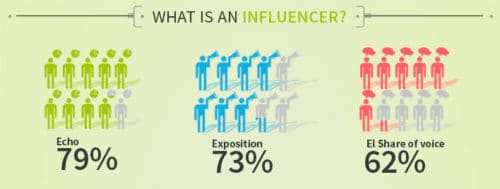
Juan Merodio,Digital Marketing, Social Networks and Web 2.0 expert, comments: I feel everyone to a certain extent is an “Influencer ” as it seems to me that when we tend to talk about Influencers only in those cases in which the Influencer reaches 1,000’s or even millions of people..but why shouldn’t those people who influence all of those around him/her on a daily basis be called Influencersas well ? I believe that at this point in time we should be taking into account both micro and macro-Influencers as both groups are critical.
Aleyda Solís:
Beyond having their content shared and a relevant audience, I would say that influencers are thought leaders and authorities whiting a sector, who actually “influence” their audience around a specific topic, by having an effect on the way they perceive or interact in a specific area or discipline.
Two characteristics that DO NOT make a person an influencer
Two of the least voted characteristics among those surveyed in respect to defining an influencer were the following:
- A mere 23% feel a well-known celebrity is an Influencer
- No more than 9% see Klout as being a valid criteria for defining the influence exerted by a person over the Internet.
In Spain, Klout has a greater degree of importance in defining who is an Influencer as 10% of those surveyed take it into account within their own Influencer Marketing strategy. On the other hand, France was found to be the market where Klout has the lowest rating as only 5% feel that a person with a high Klout scoring is deemed to be influential.
The gap may also be seen by comparing the views as expressed by marketing practitioners and those stated by communication experts. A mere 3% of marketing practitioners felt that Klout is a reliable source yet 15% of those involved in either communication or PR felt it is.
Juan Merodio: A celebrity is a famous person yet an Influencer does not have to be famous. As a matter of fact nowadays it is no longer required to be famous to have a high degree of influence as the democratization process within the scope of communications led by the social media has enabled networks to be created by highly influential people, in many cases much more influential than any celebrity
Interact and collaborate with Influencers
Once the target has been successfully identified, capturing the Influencer’s attention and creating an on-going relationship with them is far from being an easy task. 56% of those surveyed mention this as being their prime challenge and this figure is even higher in the case of France, reaching 66%.
What channels are the most suitable for contacting and collaborating with Influencers?
What situations are deemed to be strategic for collaborating with Influencers (and which ones are not)?
While interacting with a brand, what do Influencers expect in return?
What channels do you use to contact Influencers?
- 66% think email is a suitable channel to contact an Influencer
- Twitter comes in second with 57%
- The Influencer’s own Blog is being used by 52%
- Only 29% of those surveyed see Facebook , while being the most popular social network for companies and users, to be a valid channel for contacting Influencers.
- The least used channels are forums (11%) and Google+ (6%)
80% of the UK market stated that email was most effective manner. Some users feel that face to face contact with Influencers or meeting them at events are the best approaches.
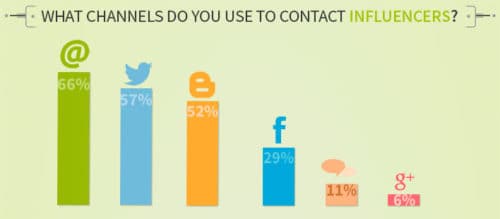
David Soler, Digital Marketing and Business Advisor, remarks:
Email is not only the best way to establish the initial contact but I also feel it is the least intrusive and the best way to introduce a brand (if you do not have a suitable email address, you may also post in the contact’s blog). In respect to the most appropriate approach, I feel the Influencer must feel that the brand has a true interest in his/her participation. A brief explanation about why they are being contacted , a link that will provide information about who the brand is and, whenever possible, further details regarding the campaign itself will be helpful in establishing this degree of trust with the possible influencer
Scenarios in which the influencer’s role is deemed to be strategic in nature
In earlier times, the scenarios in which communication practitioners played a very minor role in creating a relationship with journalists were the following: sending out Press Releases, participating in Press Conferences, having “one-to-one” brunches and not much else. Yet within the scope of Influencer Marketing, the scenarios are slightly more varied, among which we should highlight the following:
- Product launching (76%)
- Content promotion and distribution (57%)
- Events/webinar promotion (50%)
- Crisis management (44%)
- Corporate communications (22%)
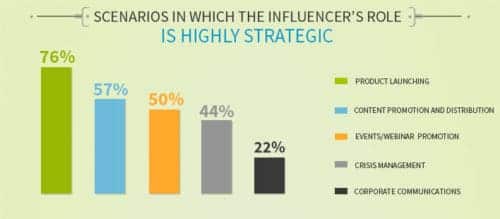
Cristina Aced, journalist and independent PR advisor told us:
Some companies have realized that a few bloggers, YouTubers, Instagrammers… have greater influence on their target group than traditional media and so they don’t hesitate to contact those new Influencers to enhance their own brand visibility
Influencers’ role in product communication
76% of all communication experts rated the role being played by influencers in product communication as being “important”, 82% being agencies and 74% companies. When we look at another aspect however we see that only 31% organize product tests and a mere 17% send out gifts or samples to their influencers. On the other hand, our findings showed that events were the main type of interaction being used in respect to product launching (55%).
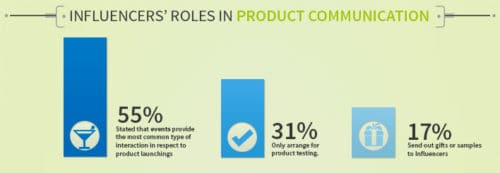
Influencers’ role in Content Marketing
Influencers seem to be playing a key role in developing branded content. 44% of those surveyed tend to collaborate with their Influencers during the content creation process (co-creation, guest articles, interviews, etc.). This practice was found to be even more commonplace in France (56%).
Those surveyed tend to count on Influencers’ role in order to successfully spread their contents: 64% of all Marketing experts mentioned it as playing a critical role. 54% of all Communication and PR practitioners agreed.

Influencers’ role in corporate communications
46% of those surveyed state they send out Press Releases to their Influencers. This trend was found to be even greater in the French marketplace (50%) when compared to the Spain where only 30% admit sending out Press Releases to their Influencers.
Only 22% think it is effective to have Influencers involved in spreading Corporate communications
David Soler:
The main Challenge will be avoiding saturation in respect to the number of requests being made to get them to play a role in campaigns and secondly avoid sending out the wrong message. I tend to receive 1 or 2 requests per week and I’d guess that around 50% of these requests are simply not interesting for me, not because they aren’t worthwhile but rather due to the fact it doesn’t make any sense to post them in my blog nor do they fit in my own personal branding policy. I do agree that the main Challenge for a company involved in WOM is to be able to detect who the influencers are and then accurately define what they are interested in. This Challenge requires spending enough time to properly analyze the Influencer, get to know him/her..as if they were part of our target group..and as a matter of fact, to some extent they really are!”..
What do influencers expect from brands?
The practitioners who were surveyed feel that Influencers tend to be more receptive to receiving benefits that will enable them to enhance the quality of their own contents (collaboration, information…) rather than material profits (monetary rewards, gifts…).
This opinion is even more pronounced in Corporate Communication and Marketing Departments, where64% feel that influencers tend to appreciate either receiving relevant information or providing support in content creation. Those working in agencies responded by saying that monetary rewards was viewed as being the most important criteria in influencer attention (20%)
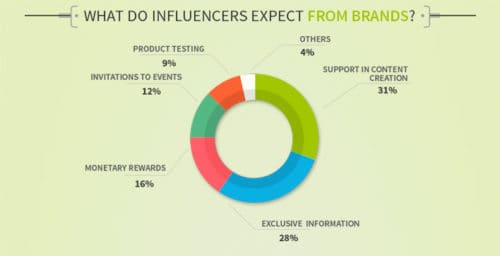
Juan Merodio: I would accept any Good Practice provided by a company in one way or another if I think it will add value and lead to a message that will reach the proper people. At the end of the day, brands create products and services that improve their customers’ lives (or at least this should be the case as it is not always true) and so, if I am somehow able to help improve someone level of life, I’ll always be more than willing to do so
Aleyda Solís: What I am expecting from a company will depend on what they are asking me to do but I would expect some type of compensation if I don’t have any type of previous relationship with them. For example, if it’s a product review, testing or feedback I would expect free access to it.
Measure the ROI derived from influencer marketing actions

Measuring ROI derived from these actions appears in the third spot among the concerns expressed by those surveyed (44%).
Nonetheless, this is the prime concern stated by agencies (58%) as being able to prove a clear cut return on their actions is a Critical Success Factor in their business.
In the UK market, being more mature than either those in France or Spain in respect to Influencer Marketing, this measuring is also being viewed as their main concern (71%).
What budgets are being spent on Influencer Marketing at this point in time?
What indicators are being used to measure the effectiveness of this type of campaigns?
Budget Invested and Outlook
- Most of those surveyed invest between 1 and 20% of their overall spending (48%)
- 16% of those surveyed do not invest anything in their Influencer relation management .
- 9% invest between 21 and 40% of their Budget
44% of those surveyed stated that they will be increasing their Influencer Marketing budget in 2014. And In those cases where they are already investing over 20% of their total spending this figure rose to 61%.

David Soler:
It’s necessary to invest in Influencer Marketing and for numerous reasons. The most practical one is that in today’s world a blog has a high degree of influence on consumers. Many bloggers, and even more so in the areas of clothes or travel planning, have taken on the role that traditionally was in the hands of critics and now their readers are eagerly awaiting their recommendations. And then there is the way brands position themselves on the web, thanks mainly to the links that may be offered by their Influencers. This is true as long as their digital media strategy is well planned
What indicators are they using to measure the effectiveness of their influencer actions?
- 65% measure their effectiveness by the number of times that they are mentioned in blogs or in social media.
- 51% look at the number of times their content has been shared.
- 42% according to the web traffic being generated.
Yet only 31% use business-based criteria, such as the number of sales opportunities that have been created.
Cristina Aced:
With Influencers, we tend to measure effectiveness in the same way we measure our relations with other traditional media while tweaking certain online metrics, such as the number of times the brand has been mentioned in social media, analysis of the contents in these mentionings, user reactions to this type of repercussions (comments posted , “I like’s”, RT’s…), the brand’s web positioning, traffic being generated to the corporate website/blog /online store…yet we must not forget that we should never mix quantitative and qualitative evaluations
Effectiveness of applying an influencer marketing strategy
69% of those surveyed state that their Influencer Marketing strategy is effective or that it obtains the desired results. This figure rises even further (80%) in those cases in which the practitioners that have been working with Influencer Marketing for 2 years or longer.
The effectiveness of an Influencer Marketing strategy is also linked to the budget being invested:
- Among those surveyed who are not investing in Influencer Marketing only 10% feel that it is either effective or very effective.
- Those who are investing between 1 and 20% of their budgets 35% deem it is either effective or very effective
- When we look at those who are investing between 21 and 40% of their budget 51% feel it is either effective or very effective.
Juan Merodio:
I think there are going to be more and more actions focused on Influencers yet once that has been said, a well-designed Influencer Marketing campaign should be more concerned with quality than quantity. This means if we were to make our choice based on quantity using the number of followers on Twitter, Facebook fans or Youtube views for instance as our criteria this would be a mistake as these numbers cannot be bought.
Aleyda Solís:
Thanks to the maturity that online marketing investments and campaigns are experiencing, along the launching and evolution of tools with deeper analysis and easier segmentation capabilities, I would expect “influencer marketing” actions to be refined, by connecting with the real influencers of the relevant sectors, specific KPIs, goals and ROI in mind.

